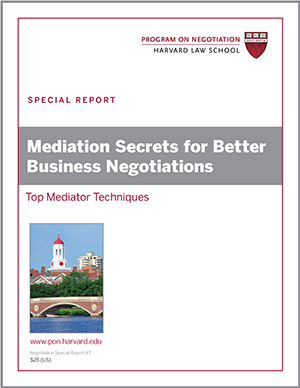
Negotiations have reached an impasse, but both sides agree on one thing: you need help resolving the dispute. You engage a neutral mediator to do just that. Rather than acting as a judge who decides who “wins” or “loses,” a third-party mediator in this mediation assists parties in reaching an agreement.
Negotiators often feel unprepared for mediation. The very fact that your “negotiation” is now officially a “dispute” is enough to make you approach the next stage with trepidation. Here’s how the mediator is likely to proceed and how to take advantage of his presence to secure the best possible deal for your company.
The Stages of the Mediation Process
Stage 1: The Joint Session. Though your mediator may contact you and the other side in advance regarding logistical matters, mediated negotiations typically begin with a joint-session that serves to educate the mediator, to uncover any differing views of the facts, and to clarify what each side considers a satisfactory resolution to be. The number of people present will vary, but each side generally includes a spokesperson (typically a lawyer), one or more people involved directly in the dispute, and someone with the authority to enter in to recommend a binding settlement.
At the joint session, the mediator is likely to encourage all participants to introduce themselves and present what they view to be the facts and the desired outcome of the dispute. The mediator will also ask questions that enable him to better understand the dispute and its underlying dynamic.
Some mediators will continue discussions in joint session, hoping that the open exchange of views will quickly resolve the dispute. Many mediators, however, will at some point move to a second stage of separate meetings with each party known as caucuses. One mediator says that she transitions to the caucus stage when exchanges in the joint session begin to “generate more heat than light.” If emotions are running especially high, the mediator might bypass the joint session altogether and proceed directly to caucuses for fear of undermining settlement efforts.
Stage 2: Caucuses. Your mediator will typically begin separate sessions with each party with a statement such as this: “As you know, whatever you say to me in caucus is confidential. I will not repeat anything to the other side that you don’t want me to repeat.” Having provided this assurance, the mediator begins collecting information about each side’s interests. He’ll want to know the underlying needs or concerns implicated in the dispute, as well as the importance you attach to each.
Armed with such information, the mediator begins moving back and forth between the teams for a series of conversations, suggestions, proposals, and counterproposals aimed at building a resolution that will satisfy each party’s core interests, a process sometimes called shuttle diplomacy. The mediator will want to know what settlement terms you’d find acceptable – and that you think the other party might accept. He may also try to identify your non-settlement alternatives.
Depending on the complexity and importance of the matters in dispute, it can take several hours, days, months, or even longer to reach an agreement. Ultimately, mediation leads to resolution in approximately 80% of all mediated disputes. Sometimes the resolution is truly “win-win.” At other times, one side is thrilled with the deal, and the other considers it barely acceptable – though better than a long, uncertain, and expensive journey through the courts.
Enhance your mediated outcomes
Now that you know how mediation works, here are some tips aimed at ensuring that you emerge from the process with a great deal.
Mediation Tip #1. Solicit the mediator’s opinion.
The mediator’s private conversations with each party are likely to lead him toward a settlement framework that will please everyone involved. Some mediators volunteer settlement ideas; others, who are less activist, will not. Consider asking the mediator for suggestions regarding your own settlement proposal.
This tactic not only assists you in identifying a proposal that would suit you but also takes advantage of the mediator’s knowledge of the other side’s interests—and helps you avoid making a proposal the other side will find offensive. Suppose you plan to initially demand $9.5 million from the computer manufacturer and gradually reduce your demand to as little as $2 million. Rather than simply asking the mediator to convey this offer to the other party, you ask what he thinks of it.
“The other side thinks your current $10 million claim is outrageous,” he tells you. “An opening proposal of $9.5 million could make serious negotiations impossible. Here’s a suggestion. If you open at $7.5 million, I can point out the substantial amount by which you’ve moderated your claim. I’ll suggest that if the other side’s next offer is similarly moderate, each side will have demonstrated a good-faith desire to settle, and we should be able to do so.”
Although you’re under no obligation to accept the mediator’s advice, recognize that his private conversations with the other side have given him considerable knowledge about the other side’s interests. Taking advantage of that knowledge may lead to a settlement that’s high enough to enable you to pursue your investment opportunity.
Mediation Tip #2. Give the mediator your great ideas.
When talks escalate into a dispute, negotiators often develop negative opinions about each other. If only the other side was bargaining in good faith, you might think, we would have resolved this issue long ago. Such views can lead each side to respond to the other side’s settlement proposals with skepticism—a tendency that psychologists have termed reactive devaluation.
Obviously, skepticism does not bode well for agreement.
Your mediator can help you overcome this barrier. Imagine that your conversations with the mediator have led you to a novel settlement plan: you propose a joint donation of the fragile laptops to public school systems (which can bolt them down to make their fragility less of an issue) in the countries where you do business.
This move could generate favorable publicity for the manufacturer and for you while also introducing schoolchildren (future computer buyers) to both companies. Rather than taking the risk that the manufacturer will reactively devalue your idea, suggest to the mediator that he propose it as his own idea. If the mediator believes your plan is fair and has merit, he may help you refine it—and present it in a way that minimizes the other side’s skepticism.
Mediation Tip #3. Take a reality test.
Sometimes the unrealistic views of your own team members will turn out to be the major barrier to settlement. If they fail to understand the other side’s interests or priorities, they may advocate standing firm and waiting for concessions. Or perhaps certain members of your team have an exaggerated view of the likelihood that in the absence of a resolution, a court will rule in your favor.
Your ability to persuade your colleagues of the unrealistic nature of their views is limited; after all, if you contradict them too strongly, they may doubt your loyalty. Therefore, when negotiating within your team, use the mediator to bolster your position by asking for his views on the internal debate:“How likely is the other side to concede? How likely are we to prevail in court?” Your team members are apt to accord special status to the mediator’s neutrality and experience.
Know when to say no
As you take advantage of these techniques, keep in mind that your interests and those of the mediator may not be identical. The mediator’s sole interest is to help the parties achieve a settlement. This is also your interest, of course—but only if the settlement is preferable to your no-settlement alternatives, such as a trial or termination of your relationship with the other party.
Thus, you must ask yourself whether following your mediator’s advice will lead to an agreement that is better for your side than no deal at all. Imagine that after two intensive days of proposals and counterproposals, you and the computer manufacturer have agreed to a joint donation of the too-fragile laptops to public schools but not on the amount the manufacturer will pay you for lost profits. You most recently demanded $1.75 million.
The mediator proposes that you accept $1.5 million, along with various other commitments from the manufacturer. Although these interests may be worth more than $0.25 million, it’s impossible to assign them a clear financial value. The mediator tells you that he’s reasonably certain the other side will accept this proposal and that if you accept it, the dispute will be satisfactorily resolved.
What should you do? Most critically, don’t accept the mediator’s proposal just because he has been working hard to help you reach agreement. Instead, ask yourself whether you might do even better. Why not tell the mediator that you want both $1.75 million and the proposed commitments?
The other side might agree to this deal. If not, you can gradually reduce your financial demands until either the other side agrees or you decide to pursue an alternative to settlement. Remember that the object of mediation is not to please the mediator but to secure the best deal possible for you.
Are there any crucial mediation tips that we may have missed? Let us know in the comments.
Related Mediation Article: Examples of Alternative Dispute Resolution (ADR): How Mediation Works
Adapted from “Get the Best Deal Possible in Mediation,” by Stephen B. Goldberg (professor, Northwestern Law School), first published in the Negotiation newsletter, November 2006.
Originally published in 2012.





The article says that, “The mediator’s sole interest is to help the parties achieve a settlement.” As a mediator, I would not say that. Rather, I would say that my job is advance the interests of the parties wherever that leads. It may (often) leads toward a settlement. But if a party rationally concludes that its BATNA is better than whatever settlement proposal is on the table, I do not see my role is to try to talk them into an agreement. If the involved parties essentially say, “We cannot agree on much except we all want to settle this case,” I will take that as latitude to push them toward settlement. Even then, I will check periodically to confirm that their key interest is settlement.
The above submission on mediation has added more value to my knowledge of mediation
Thank you
I am interested in learning more about your program to become a Mediator. My background is in Labor Relations, as a Union President and Business Agent, I have had decades of experience and seek to become a Mediator. Thank you.
Hello,
Our next Mediation program runs in October 2018. Please check our website for rates and information.
Thank you for this post.
I’d like to clarify that the process outlined above is a version of mediation that has been developed over time by attorneys and the legal system as an adjunct of litigation. I would describe this process as a “settlement conference.”
There are numerous theories and models of mediation that bare little, if any resemblance, to the process described here.
Thank you again.
Debra Healy, MS